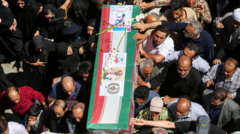The International Atomic Energy Agency reveals that Iran's nuclear program, albeit temporarily damaged, could rebound rapidly, highlighting diverging views between U.S. officials and international assessments.
Iran's Nuclear Program: Rapid Recovery on the Horizon

Iran's Nuclear Program: Rapid Recovery on the Horizon
As tensions escalate, Iran may resume uranium enrichment within months, despite U.S. claims of a crippling attack.
In a recent statement, Rafael Mariano Grossi, the director general of the International Atomic Energy Agency (IAEA), reported that Iran might resume uranium enrichment activities in a matter of months following a U.S. attack that targeted two of its enrichment centers. While the extent of damage from the strike has been described as "severe," Grossi clarified that it was not total, underscoring a significant misalignment with U.S. assessments, particularly those of former President Trump.
President Trump confidently asserted that the attack had obliterated Iran's nuclear ambitions, effectively claiming success in disrupting the country’s capabilities. However, Grossi's remarks align more closely with analyses from U.S. intelligence agencies, including a preliminary report from the Defense Intelligence Agency. This report indicated that the strike may have only delayed Iran's nuclear progress by a few months.
Further complicating the situation, the C.I.A. director expressed concerns about the severe damage inflicted on Iran’s nuclear infrastructure, although U.S. intelligence continues to re-evaluate the full implications of the military strike. The geopolitical landscape further transformed following a deadly attack on Evin Prison in Tehran, where reports indicated that 71 individuals, many of whom were dissidents and political prisoners, were killed during an Israeli operation on June 23.
As Iran navigates the aftermath of a 12-day conflict with Israel and the U.S., the nation finds itself at a critical juncture. With its economy in tumult and leadership urging for changes described as “a golden opportunity,” the international community watches closely to see how Iran will respond in the coming months. As global powers weigh their next moves, the potential for Iran to quickly resume its nuclear endeavors raises significant concerns about stability in the region.
President Trump confidently asserted that the attack had obliterated Iran's nuclear ambitions, effectively claiming success in disrupting the country’s capabilities. However, Grossi's remarks align more closely with analyses from U.S. intelligence agencies, including a preliminary report from the Defense Intelligence Agency. This report indicated that the strike may have only delayed Iran's nuclear progress by a few months.
Further complicating the situation, the C.I.A. director expressed concerns about the severe damage inflicted on Iran’s nuclear infrastructure, although U.S. intelligence continues to re-evaluate the full implications of the military strike. The geopolitical landscape further transformed following a deadly attack on Evin Prison in Tehran, where reports indicated that 71 individuals, many of whom were dissidents and political prisoners, were killed during an Israeli operation on June 23.
As Iran navigates the aftermath of a 12-day conflict with Israel and the U.S., the nation finds itself at a critical juncture. With its economy in tumult and leadership urging for changes described as “a golden opportunity,” the international community watches closely to see how Iran will respond in the coming months. As global powers weigh their next moves, the potential for Iran to quickly resume its nuclear endeavors raises significant concerns about stability in the region.






















